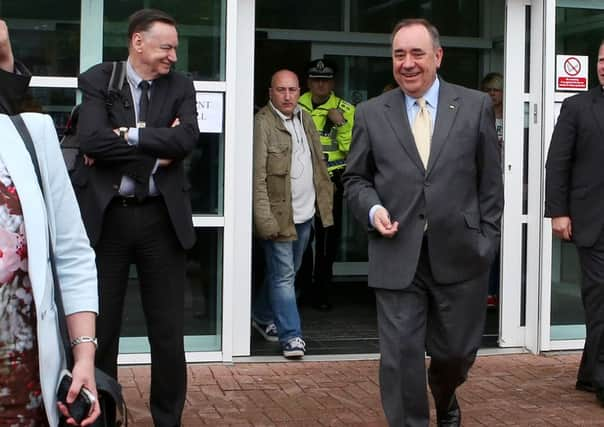Leaders: Why Salmond’s spin doctor should go


ALEX Salmond was wrong to stick by his beleaguered spin doctor Campbell Gunn yesterday, when pressed in the Holyrood parliament to sack him. He was wrong because, however honourable his desire to stand by a loyal employee and close personal aide, the First Minister owes a higher loyalty – to the integrity of his office and to the nature of the political debate he has sparked with his independence referendum.
Mr Salmond set out his defence of Mr Gunn yesterday. He conceded that Mr Gunn’s decision to send an e-mail to a newspaper about Better Together campaigner Clare Lally was both a mistake and an error of judgment. He implied it was inappropriate. Afterwards, his spokesman came out and said it was not appropriate. But later Mr Salmond said it did not amount to “dissemination of inappropriate material” in terms of the code of conduct, which would have meant Mr Gunn’s “automatic” dismissal.
Advertisement
Hide AdAdvertisement
Hide AdMr Salmond’s judgment that the word “appropriate” can mean different things will appear inexplicable to the public. And that perception is important.
If one of the imperatives of the referendum campaign is the need for mutual respect and a debate elevated above personal invective, then Mr Salmond is sending the wrong signal. By insisting Mr Gunn adhered to the letter of the code of conduct, he has ignored the need to adhere to spirit of the code as well. And Mr Gunn’s clumsy attempt to undermine Ms Lally’s credibility was clearly against the spirit of the code.
Mr Gunn is not a party press officer or a referendum campaign worker. He is employed by the Scottish Government, with his salary paid for by the taxpayer. His behaviour has to meet a higher standard. The government has to be held to a higher standard. The government has to hold itself to a higher standard. The way of the political world is that spin doctors are rarely sacked but tend to resign when they, and not the government they represent, become the story. The form of words used in these circumstances is a familiar one. The spin doctor has become “an unacceptable distraction from the business of government”. The spin doctor then resigns, thanking his or her boss for their sterling support but insisting it is time to step aside for the greater good. The boss then accepts the resignation, with reluctance and regret.
With First Minister’s question time dominated by the saga yesterday, and with yet another day of negative coverage today, it can be safely said that the spin doctor has become the story. Mr Gunn resigning now will not help Mr Salmond recover from this debacle. He needed to show clear leadership and send a signal about zero tolerance of the sending of “inappropriate” material, showing the country and the world that he was willing to pay a price to be seen to be leading the move for respectful and considered debate. That opportunity has passed. But Mr Gunn should still go.
An affront to justice
THE decision by an English court to hold most of a terror trial in complete secrecy is an affront to both democracy and justice.
In effect, the authorities are saying: “We know so much about this alleged plot, we cannot reveal how we know it.” This may be a sincerely held view, but it is not enough of a justification for such a cavalier disregard of some of the fundamental tenets of justice.
There was a partial victory for campaigners yesterday when the Court of Appeal blocked an attempt to have the entire trial held in secret. Now only the “core” of the trial will be behind closed doors, with some elements made public, including the names of two accused, who have been identified as Erol Incedal and Mounir Rarmoul-Bouhadjar.
Obviously, the sensitivities in such a case have to be recognised. Evidence was clearly gained in a way which, if the method was known, would jeopardise its effectiveness as an anti-terror asset in the future.
Advertisement
Hide AdAdvertisement
Hide AdIf this is the case, the answer cannot be to throw the key principles of open justice overboard and carry on with a trial in secret, with the evidence against the accused kept from the public. We are being told that all is well and we should accept that the secret services and judges know best. But how can we – the public and the media organisations that seek to inform the public – come to a judgment as to the credibility of the evidence, or whether the eventual verdict appears sound? How, in these circumstances, can the courts be held accountable for their actions, with appropriate checks and balances in place?
Secret justice is not justice. Instead, it is a step along a road to a police state. This is indeed a sad day for democracy.